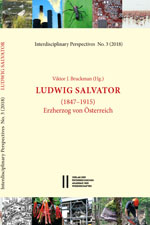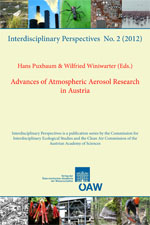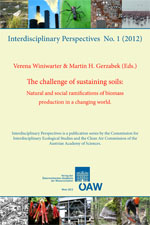Interdisciplinary Perspectives
Never before in human history has scientific basic research created results of such a quality and intensity. With the still increasing global population it is indeed necessary to apply these scientific results to make it possible for us and future generations to cope with the limited resources of our planet. When it comes to the practical application of the results of basic research, however, we realize that without careful consideration it is not possible to find optimal solutions for the wellbeing of society and to avoid errors.
Looking for answers for such complex questions we realize that scientific experiments and technical methods will produce essential knowledge. However, for the practical solution we also need information provided by political, juridical and social sciences. Indubitably, for further development interdisciplinary approaches will be necessary. The special problem we face is that there are no routine methods available for interdisciplinary research. Natural scientists often consider empirical data with skepticism or even rejection. Social scientists on the other hand very often are equally suspicious of the technology and the experimental understanding of natural science.
The Commission for Interdisciplinary Ecological Studies and the Climate and Air Quality Commission of the Austrian Academy of Sciences endeavor to contribute to the interdisciplinary dialogue of important societal problems and to further innovative approaches with its series "Interdisciplinary Perspectives".
Series editors
Viktor Bruckman, Ernst Bruckmüller, Martin Gerzabek, Gerhard Glatzel,
Marianne Popp und Verena Winiwarter.
Order your personal copy
You may ceck availability and price of individual volumes at the website of the Austrian Academy of Sciences Press.
Published:

Volume 3: Ludwig Salvator (1847 - 1915)
BRUCKMAN Viktor J. (Hg.)
Brief description
Erzherzog Ludwig Salvator was one of the few public characters whose scientific ambitions are still recognized after more than hundred years. Today, his work is more relevant than ever before in view of the significance of the Mediterranean region as cultural heritage in a rapidly changing world. His work is based on the relationship between humankind and nature. Recent years showed that environmental protection and the sustainable use of resources are core components for a long-term existence of humanity and conflicts are often based on the loss of ecosystem services.
A solution of such problems requires interlinked thinking and a combination of technical, ecological and socioeconomic disciplines, which eventually allows for entirely new and promising approached to be developed. However, this requires courage and creative minds, such as Ludwig Salvator. He emphasized on the cultural heritage and collected fables in Mallorca and studied galgolithic inscriptions. At the same time, he documented flora and fauna in detail with drawings and extensive records, assessed geological structures, as well as agricultural systems and even how local markets and trade was organized. His structured approach becomes obvious with the development of the famous “Tabulae Ludovicianae”, an extensive demographic-geographic questionnaire. He collected responses of local decision makers and experts and systematically combined the gathered information with his own records in a meaningful way.
This collection of contributions of a symposium represents evidence for the holistic approaches and innovative pioneering work of Ludwig Salvator and attempts to provide an overview of his activities and manifold legacies.

Volume 2: Advances of Atmospheric Aerosol Research in Austria
PUXBAUM Hans and WINIWARTER Wilfried (Eds.)
Brief description
Aerosols exert decisive influence to important properties of the atmosphere. Aerosols represent low concentrations of fine particles which exist in solid or liquid phase in the surrounding atmosphere. The phase difference is critical for aerosol effects to
- the optical properties of the atmosphere (the radiation balance is affected by absorption or reflection of light on surfaces, with consequences to climate),
- cloud formation (particles are nuclei for condensation of cloud droplets, affecting weather and climate),
- atmospheric chemistry (particle surface enables and catalyzes transformation of air pollutants),
- health (particles may become trapped in the respiratory tract or transfer into the cardiovascular system causing inflammations).
Furthermore, fine particles may remain airborne over large distances and are important for the transport of biologically important trace compounds. They also contribute to global distribution of prebiotic structures as well as viruses, bacteria ore fungal spores.
This volume compiles the achievements and contributions of Austrian research to this important field. Members from the Clean Air Commission of the Austrian Academy of Sciences and guest authors provide an overview of the state of science in Austria in its relationship to the international advances. Starting from developing measuring instruments to the results and interpretation of field campaigns, the contributions also show how measurement results are apportioned to individual sources, and how their health impacts are quantified. Another strand of methods includes emission modelling and simulation of emission abatement options, which furthermore serves to assess the regional distribution of air pollution as well as the global circulation in terms of establishing its impact to climate.
The health impacts of aerosols are at least discussed in the public debate, while still not leading to the implementation of emission abatement as would be needed. The exploration of aerosol in its relation to climate has not even arrived at that stage. Considerable additional scientific attention is required. Further studies are needed on quantifying the effects of „dark“ absorbing aerosol that acts like a greenhouse gas, versus the reflecting „white“ aerosol which decreases any warming effect from anthropogenic activities. This theme will be covered to some extent by the upcoming 5th IPCC assessment report, but moreover provide ample opportunity to further contributions of Austrian aerosol scientists to a global benefit.

Volume 1: The challenge of sustaining soils: Natural and social ramifications of biomass production in a changing world.
WINIWARTER Verena and GERZABEK Martin H. (Eds.)
Brief description
Soils perform a variety of functions. Soils are the basis of food and other biomass products; they provide crucial resources; and they store, filter, and transform materials (such as water) that are vital for life.
Soils are a physical and cultural environment for humankind, a natural habitat, and they sustain the largest gene pool in the biosphere.
Pressures on soils are increasing dramatically. Soils need to become central to global change discussions in order to advise policy makers in their understanding of the potentials, limits, and vulnerabilities of soils. In particular, strategies for sustainable management of soils in a rapidly changing world require a better understanding of soil-human interactions. Human impacts on soils are complex and site specific; resulting in pressures on biodiversity, water availability and quality, and the atmosphere. Our rapidly increasing needs for food and energy place growing and conflicting demands on soil. Development issues, food security, nature conservation, our dependence on fossil fuels, social inequality, and armed conflict all have a bearing on soils. This volume is a truly interdisciplinary attempt to offer an overview of the natural and the social side of the challenge of sustaining soils. 21 world-renowned experts from a wide range of backgrounds review the existing knowledge from which an integrated assessment of the challenges ahead emerges. Soils and societies are linked in a historically and geographically wide-ranging overview that allows readers to understand how deeply-rooted current problems are, but also offers a perspective on potentially sustainable solutions. The links of soils and atmosphere are described with respect to biomass production and global climate change, which are considered together. How the agrofuel option has been transformed into EU policy and how this policy in turn transformed and continues to transform European and African land is another topic, which is discussed in depth.
In this book, soils are put centre stage in the debate about global climate change and biomass production, which influences considerably the evaluation of sustainable options for the future.
Contact
Commission for Interdisciplinary Ecological Studies
Austrian Academy of Sciences
Dr. Ignaz Seipel-Platz 2
1010 Vienna
T +43 51581-3200, -3210